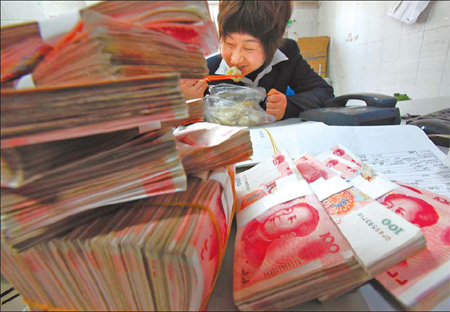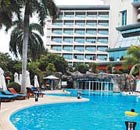Top Stories
'Golden week' priceless for stores
By Meng Jing (China Daily)
Updated: 2010-02-22 08:31
 |
Large Medium Small |
Sales rocketed by 15 percent during the seven-day Spring Festival holiday in the capital compared to last year, according to the Beijing Municipal Commission of Commerce (BJMCC).
 Accountant Liu Xinhua at a Suning store in Liujiayao area has lunch during a short rest yesterday. Workers at the home appliance giant stores across the city worked without taking holidays due to brisk sales. [Agencies] |
The commission sampled 3,085 outlets of 126 major stores and restaurants and found they took 3.48 billion yuan between Feb 12 and 18 - 450 million yuan ($66 million) more than during Spring Festival holiday of 2009.
A spokesperson surnamed Hu from the BJMCC's press office said gold jewelry, household appliances, restaurant meals and New Year gift packages were the four main targets of the spending.
Caibai, a major Beijing jewelry store, took 190 million yuan during Spring Festival, a jump of 16 percent on last year.
On Feb 14, the first day of the Year of the Tiger as well as Valentine's Day, Caibai sold jewelry worth nearly 40 million yuan, one of the company's best days ever.
Gongmei, another major jewelry store in the city, saw a jump of 21.5 percent in sales during the week.
Li Ying, vice-director of Gongmei's marketing department, said Beijingers have a long tradition of buying gold during Spring Festival, adding that residents from neighboring cities also like to buy their gold in Beijing.
Gold is thought to bring good luck and is considered to be an inflation-proof investment by many.
Chen Siying, a Beijing white-collar worker who bought a 1,680-yuan angel-shaped gold pendant for herself during the holiday, was among them.
She said the pendant is a more lasting investment than buying clothes or shoes at New Year.
Jewelry stores were not the only big winners; turnover in 369 restaurants in the capital increased by 23.8 percent during Spring Festival.
Suning, Gome and Dazhong, the three major sellers of household electrical appliances in Beijing, also loved the holiday week, seeing sales jump by an average of 32.9 percent, according to the BJMCC report.











